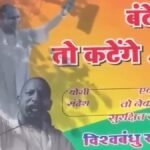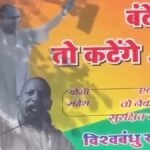
For once the deputy chief minister of Maharashtra Ajit Pawar spoke sense when he spoke out against UP Chief Minister Yogi Adityanath’s “Batenge toh katenge” remark. Pawar, who finds himself caught in a cleft stick, pointed out that it was an outsider who had made such a remark given that Maharashtra was a state that had a history of maintaining communal harmony.
There is little doubt that some of the greatest movements of social and political reform during the 19th century were witnessed in Maharashtra. Six of the key makers of modern India came from Maharashtra including Jyotiba Phule, Lokmanya Tilak, Gopalkrishna Gokhale, Dr Babasaheb Ambedkar, Tarabai Shinde and Hamid Dalwai.
But we cannot forget that Maharashtra is also the home of the RSS and its founding fathers, largely Chitpavan Brahmins, and it is this organisation from which much of this divisive propaganda is presently emanating.
But Yogi Adityanath is an exception even to the tradition of the RSS where doublespeak is tinged with some caution. Yogi is not one to exercise any such caution. His political career has been built around the naked acquisition of power and his governance record is peppered with extrajudicial killings and excesses combined with rabid rabble-rousing statements which are issued primarily to heighten a sense of anxiety and fear amongst the Hindus.
From the start of his career he has depended on his leitmotif of hate speeches to raise the pitch in every election.
His armoury comprises anti-Muslim speeches and this combined with his strong-arm tactics has seen him emerge as the poster boy of Hindutva whose rhetoric is always one step ahead of Prime Minister Narendra Modi.
The attack on Hindu minorities in Bangladesh has helped reinforce this narrative of Hindu victimhood, exacerbating a sense of fear and insecurity amongst the majority community who are constantly being warned about impending attacks from the Muslim community.
Yogi likes to boast about how in UP today, Muslims have stopped offering namaz on the roads and been forced to remove loudspeakers from mosques. Sadly, this sense of Hindu victimhood is, he believes, a stepping stone towards creating a sense of Hindu unity. Underlying Yogi’s message and that of other BJP leaders is the implication that Hindus will remain safe only if they vote for the BJP.
No other political party has strongly challenged this divisive propaganda or stopped to ask whether in fact minorities living in India are opposed to the majority or to the nationalist goals laid down by our Constitution.
Ahead of the Maharashtra Assembly elections, posters featuring Yogi’s “batenge toh katenge” slogan came up in several parts of Mumbai. Initially, the BJP disassociated themselves from this slogan claiming that these posters were not the doing of their party.
But Yogi’s speech has been followed by the prime minister who while addressing a large rally in Dhule used double entrende very effectively to state, “Ek hain toh safe hain”. (Unite and we will be safe).
Modi’s speech is but a variation of Yogi’s slogan. Political commentator Sudheendhra Kulkarni pointed out that while using the word “safe”, the prime minister was issuing a warning that there is a threat to a section of Indian society (read Hindus) from within the country itself. Once again, the needle of suspicion is pointing in the direction of the minority community.
The fact is that Modi has been in power for the last decade and yet he is publicly admitting that he has not been able to make the country safe.
Not to be left behind, Maharashtra Deputy Chief Minister Devendra Fadnavis talked about Muslims indulging in “vote jihad” — probably implying how they would capture the votes of the public — and this had to be countered by a “dharma yudh”. Fadnavis went on to raise the communal cliché that “Aurangzeb could not defeat the Marathas”.
The public is not happy with these comments largely because no one wants to see their lives being disrupted. Communal riots flared up in Aurangabad last year during the Ram Navami festival. Were it not for the timely intervention of AIMIM MP Imtiaz Jaleel, who sat on a fast outside the Ram temple where the skirmish occurred, the situation would have worsened.
In the run up to the Maharashtra state elections, AIMIM leader Asaduddin Owaisi, gave a befitting reply to Modi’s pithy slogan stating, “Anek hain to akhand hain”, (Diversity brings strength).
“But the BJP-RSS does not believe in diversity of culture and religion. The prime minister is a follower of Golwalkar and they want to see an erasure of diversity,” said Owaisi.
He regretted that Modi does not believe in the multi-diversity of Maharashtra and the BJP does not realise that this diversity exists amongst the Muslim community also which has 33 sub castes in Maharashtra alone.
Owaisi and other Opposition leaders have brought a reality check to the communal rhetoric, stressing the misgovernance of the government. “In Aurangabad, water supply comes once in ten days for a period of eight hours. There has been a 15% cut in the agricultural state budget, 20 per cent reduction in the health budget and similar cut in the state education budget. The ruling party needs to be questioned on their non-performance across all sections,” he added.
Opposition parties in the electoral fray point out that distress is so acute amongst the farming community that 2,851 farmers committed suicide in 2023. Vidarbha saw the highest number of suicides followed by Marathwada.
Farmer leader Kishore Tiwari identified government indifference as the main reason for these suicides, especially since the loan waiver scheme has remained largely unimplemented.
Political analysts believe the two issues over which the elections are being fought are distress amongst farmers, especially those growing soyabean, and rising prices. Soyabean is grown across five million hectares in the state by over two million farmers. Although they have had a good crop, prices have crashed and the government’s MSP of Rs 4,892 per quintal is much below the farmers’ input costs which are over Rs 7,000 per quintal. To add to their woes, the central government has been importing soyabean which is presently flooding the markets.
The other concern expressed by the influential 46.6-million women vote bank is rising prices. Women across the state complain that while they are happy to have become recipients of the Ladki Bahin scheme for which the state government had made an allocation of Rs 46,000 crore, the recent hike in the price of lentils and cooking oil has upset many a household budget.
Sushma Patil, a housewife from Thane who has already received Rs 7,500 under the Ladki Bahin scheme from the Shinde government, believes political parties should focus on controlling prices of essential items such as groceries and transportation. She is suspicious about the scheme and other freebies as they have come so close to the elections.
The most recent Lokniti CDS survey has highlighted how inflation and unemployment are the key issues facing the voters. The public is not interested in seeing the ugly face of majoritarianism. For them the key issues of health, education and remunerative prices for farmers’ products remain top priority.
They also feel, to return to deputy chief minister Pawar’s statement, “Maharashtra belongs to Chhatrapati Shivaji Maharaj, Rajarshi Shahu Maharaj and Mahatma Phule. We cannot compare Maharashtra with other states… Shivaji Maharaj’s teachings were to take all sections of society along.” How much weight this statement carries with the public is something we will come to know when the results come out on November 23.
Rashme Sehgal is an author and an independent journalist

